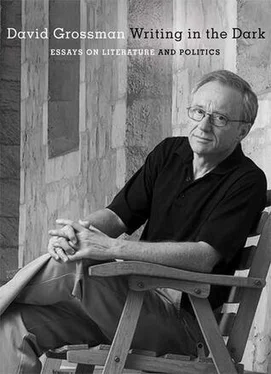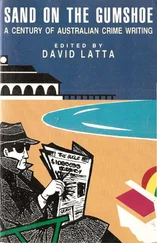To write about the enemy means, primarily, to think about the enemy, and this is a requirement for anyone who has an enemy, even if he is absolutely convinced of his own justness and the enemy’s malice and cruelty. To think (or to write) about the enemy does not necessarily mean to justify him. I cannot, for example, contemplate writing about a Nazi character in such a way as to justify him, although I felt an urge — even an obligation — to write, in See Under: Love , about a Nazi officer, so that I could understand how a normal person becomes a Nazi, how he justifies his acts to himself, and what processes he goes through in doing so.
Sartre’s exploration of why we write, in his essay What Is Literature? is relevant here: “Nobody can suppose for a moment that it is possible to write a good novel in praise of anti-Semitism. For, the moment I feel that my freedom is indissolubly linked with that of all other men, it cannot be demanded of me that I use it to approve the enslavement of a part of these men. Thus, whether he is an essayist, a pamphleteer, a satirist, or a novelist, whether he speaks only of individual passions or whether he attacks the social order, the writer, a free man addressing free men, has only one subject — freedom.”
Sartre may have been naive in his assertion that “nobody can suppose for a moment that it is possible to write a good novel in praise of anti-Semitism”; such books have been written and will probably continue to be written. But he was certainly right about the topic that preoccupies authors, and which is also the soul of literature — freedom. The freedom to think differently, to see things differently. And this includes seeing the enemy differently.
To think about the enemy, then. To think about him gravely and with deep attentiveness. Not merely to hate or fear him, but to think of him as a person or a society or a nation that is separate from us and from our own fears and hopes, from our beliefs and modes of thought and interests and wounds. To allow the enemy to be an Other, with all this entails. Such an outlook may also be militarily advantageous from an intelligence point of view: “Know thy enemy — from within him.” It could also help us alter reality itself, so that the enemy gradually ceases to be our enemy.
I would like to clarify that I am not referring to the maxim “Love thy enemy.” I cannot claim to have been blessed with such noble magnanimity (and I always find it somewhat suspect when I encounter it in others). But I am certainly speaking of a sincere effort to try to understand the enemy, his motives, his internal logic, his worldview, and the story he tells himself.
Of course, it is not easy to read reality through the enemy’s eyes. It is difficult and frightening to give up our sophisticated defense mechanisms and be exposed to the feelings with which the enemy experiences the conflict and how, in fact, he experiences us. Taking such a step challenges our faith in ourselves and in our own justness. It poses a danger of undermining “the official story”—usually the only permissible, “legitimate” story — that a frightened nation, a nation at war, always tells itself. But perhaps we can upend the previous sentence and say that sometimes a nation remains in a prolonged state of struggle precisely because it is trapped, for generations sometimes, within a particular “official story”?
There is one other clear advantage to observing reality through the enemy’s eyes. The enemy sees in us, in the nation facing him, the things that each of us always shows an enemy: cruelty, aggression, brutality, self-righteousness, self-pity. We are often unaware of everything we “project” onto the enemy, and thereby onto others as well, even those who are not our enemy — and eventually onto ourselves too.
Not infrequently, we tell ourselves that we are taking a certain course of action, committing an act of violence or brutality, only because we are in a state of war, and that when the war is over we will go right back to being the moral, upstanding society we used to be. But we must consider the possibility that the enemy — toward whom we direct these hostile and violent acts, and who thereby becomes their permanent victim — senses long before we do how much these behaviors have become an integral part of our being as a nation and as a society, and how deeply they have seeped into our innermost systems. It is also possible that reversing our point of view, by looking at ourselves through the eyes of the nation we are occupying, for example, can sound the alarm bells within us, enabling us to understand, before it is too late, the depth of our denial, our destructiveness, and our blindness. We will know then what we have to save ourselves from, and how essential it is for ourselves to change the situation profoundly.
When we are able to read the text of reality through our enemy’s eyes, it becomes more complex, more realistic, allowing us to recover the elements we suspended from our world picture. From that moment, reality is more than just a projection of our fears and desires and illusions: when we are capable of seeing the story of the Other through his eyes, we are in healthier and more valid contact with the facts. We then have a far greater chance to avoid making critical mistakes and perceiving events in a self-centered, clenched, and restricted way. And then, sometimes, we can also grasp — in a way we never previously allowed ourselves to — that this mythological, menacing, and demonic enemy is no more than an amalgamation of people who are as frightened, tormented, and despondent as we are. This comprehension, to me, is the essential beginning of any process of sobriety and reconciliation.
These are some of the counsels that literature can offer to politics and to those engaged in politics, and in fact to anyone coping with an arbitrary and violent reality. The advice may sound weak and out of touch today, against the clamor of war that surrounds us, but the principles are valid for novel-writing, for interpersonal relationships, and for delineating policies — of peace or of war.
This approach to ourselves, to the enemy, to the entire conflict, and to our lives within it, an approach I have broadly termed “the literary approach,” is to me, more than anything, an act of redefining ourselves as human beings in a situation whose essence and methodology consist entirely of dehumanization. It can once again remind us of everything we hold dear that is now in danger, and it can restore something of the humanity that was swiftly and violently robbed from us, in a process whose severity we were not always aware of. Insisting on such an approach can also, slowly but surely, put us on the road to sincere dialogue with our enemies, a dialogue that will lead, one hopes, to reconciliation and peace.
January 2006
“Our personal happiness or unhappiness, our ‘terrestrial’ condition, is of great importance for the things we write,” says Natalia Ginzburg in It’s Hard to Talk About Yourself , in a chapter in which she discusses her life and writing after a deep personal tragedy.
It is hard to talk about yourself, and so before I reflect on my writing experience now, at this time in my life, let me say a few words about the effects of a trauma, a disaster situation, on a society and on a nation as a whole.
The words of the mouse from Kafka’s short story “A Little Fable” come to mind. As the trap closes in on the mouse and the cat prowls beyond, he says, “Alas, the world is growing smaller every day.” After many years of living in an extreme and violent state of political, military, and religious conflict, I am sad to report that Kafka’s mouse was right: the world is indeed growing smaller, growing narrower, every day. I can also tell you about the void that slowly emerges between the individual and the violent, chaotic state that encompasses practically every aspect of his life.
Читать дальше












